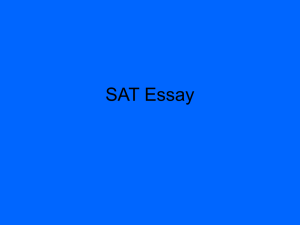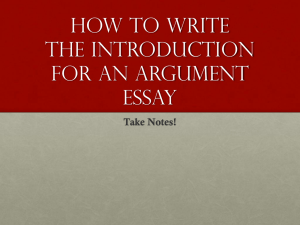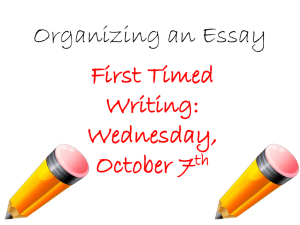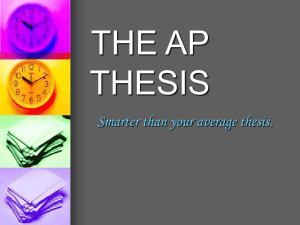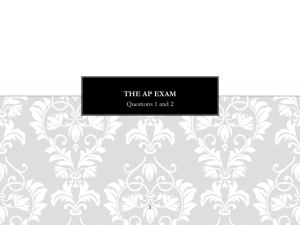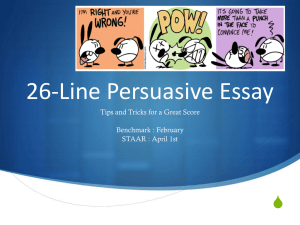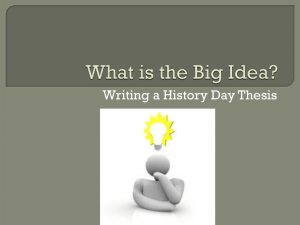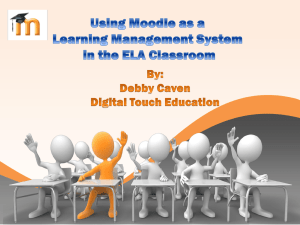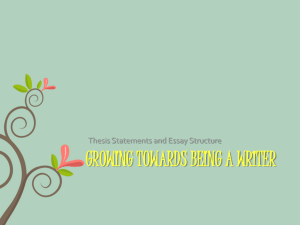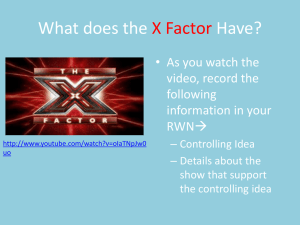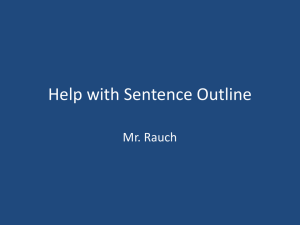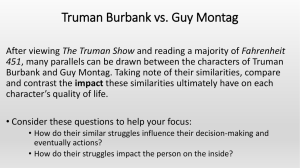PowerPoint
advertisement
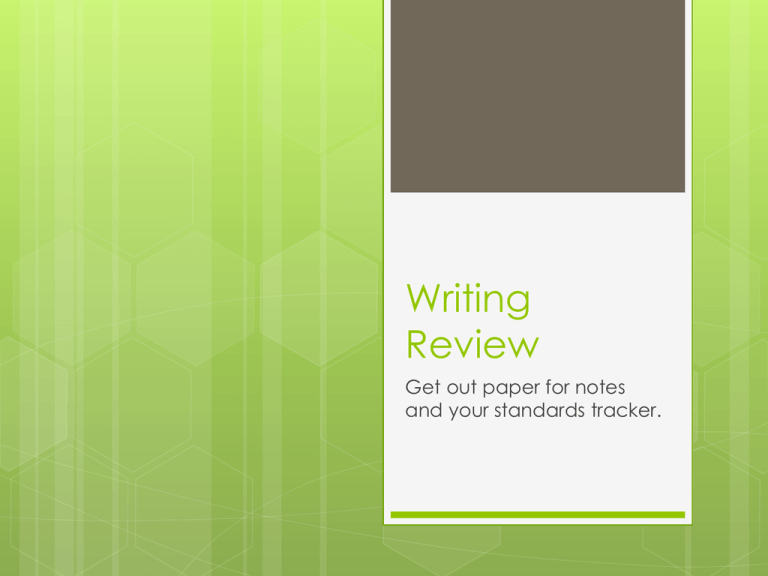
Writing Review Get out paper for notes and your standards tracker. Standards / Objectives W2: Write informative texts to examine and convey complex ideas, concepts, and information clearly and accurately through the effective selection, organization, and analysis of content. Objective: Today you will remind yourself of the key components of an essay, how to pick apart a writing prompt and how to write a thesis statement. Standard Standards 10/13/14 W2: Write Date Taught informative texts to examine and convey complex ideas, concepts, and information clearly and accurately through the effective selection, organization, and analysis of content. Text Date Tested Writing prompts 10/27/14 and articles Sprinkle- all classes test in G7 Lab Writing Assessment Schedule (11th) Tuesday, 2/17 Wednesday, 2/18 Thursday, 2/19 8:15 – 10:45 - 2nd period 8:15 – 10:45 a.m. – 8:15 – 10:45 a.m. 3rd pd. English – 7th pd. English 12:15 – 2:45 p.m. - 4th pd. English 12:15 – 2:45 p.m. 12:15 – 2:45 p.m. – 5th pd. English – 6th pd. English 4th, 5th, and 6th period, you will take 1st lunch on your testing day and report to G7 Lab as quickly as possible. Displacements Testing Date: Tues. 2/17/15: Monitor Testing Date: Wed. 2/18/15: Monitor Period 6th Period 7th Testing Date: Thurs. 2/19/15: Monitor Period 2nd 4th Displaced Location AN-11 B. Smith Displaced Location BN-7 Heitt Displaced Location Gym M-2 Biggs Marshall Prior Knowledge Review Brainstorm What components do you need in an essay no matter the type? Introduction: Body paragraphs hook intro of topic and stimuli Clear, concise, thesis State your claim that connects with the thesis Transitions Evidence from text to support thesis and main supports (quote) with parenthetical citation to avoid plagiarism Explain how your evidence supports your claim (commentary) Conclusion that wraps up the entire concept Re-state the thesis in s new way Summarize main points Answer “so what” – make the reader consider the implications of theses points Informative/analytical Essays Basic Definition: to educate your reader on a topic Informative: Evaluative: Analysis: Explanatory: Expository Multitude of uses: evaluate the effects of a new law, to compare two movies, to analyze a piece of literature, to examine the problem of greenhouse gases in the atmosphere, inspection summary Forms of informative essays: Define a term Compare and contrast something Analyze data Note: There are many other forms, but our purposes we will focus on these three. Informative/analytical Essays DO NOT… Give an opinion Attempt to persuade the reader to change their beliefs If you give an opinion in phase one – you are not on topic and will not score well on development or focus & organization Prompt The purpose of an essay prompt is to inspire a response in the form of an essay, which will test your writing, reasoning and analysis skills. What does the prompt even MEAN?! Task -read the prompt and determine what the prompt is asking you to do. Make notes on your prompt to guide you. Look for the verbs Issue- What is the issue/subject you need to write about? Purpose-What is the reason for writing? What are you trying to get your audience to understand? •Expository/analysis - writing informative and explanatory texts to examine and convey ideas and information clearly •Persuasive - writing opinions on topics or texts and supporting a point of view with reasons and information Model learning activity Please read “It’s Not You, It’s Me” by Annie Murphy Paul and“The Secret to Raising Smart Kids by Carol S. Dweck. After you have read the texts, write an essay that analyzes how Dweck and Paul each use and refine the meaning of the term intelligence over the course of their articles. Be sure to also discuss the similarities and differences between their definitions. Cite strong and thorough evidence from both texts to support your analysis. Follow the conventions of standard written English. Write your essay in the space provided in the next pages. Based on TIP, what is the overall question this prompt is asking? Be very clear and specific? Creating a Thesis Statement – what is the question the prompt is asking? 1. Determine essay’s topic (ISSUE) Example: How two authors define the term intelligence 2. Determine what kind of paper you are writing and what kind of thesis statement you need to use: (PURPOSE). Example: informative/analysis 3. Determine how you will construct your thesis (TASK – what it needs to include) Example: Explain how the authors define the term Compare and contrast the two definitions 4. What question does the prompt ask, overall? Example: What are the similarities and differences in the way the two authors define the term intelligence and how do these authors define the term in their text What’s a thesis statement? UMMMM, It’s THE most important thing in your whole essay! It is an extension of the ISSUE/SUBJECT you identified in TIP What does the thesis statement do? What is its purpose? WHAT IS A THESIS STATEMENT? So, your thesis statement should inform the reader what the task, issue and purpose is! What does the thesis statement do? It contains the essay’s topic and your viewpoint (if the prompt asks you to express a viewpoint) Tells your reader what the essay will be about Usually comes at the end of the introduction Only one sentence Must be a complete sentence Everything in the essay must support the thesis Introduction paragraph should follow this format: Attention getter (commonly known as a “hook”) Introduce the topic State the thesis Now annotate! Annotation: to add notes to a text or diagram giving explanation or comment It helps you interact with the text and therefore comprehend more. What to write down while annotating? Ask questions: Are you confused about something? Write the question down in the margins. React to what you read: Maybe you read something that just made you mad, startled you, or brought you to tears. Write down your reaction to the text so you can remember later. What to write down while annotating? Locate important passages: Is there a quote that you think is important or thoughtful? Is there an idea you think might be worth remembering? Is there a ‘big idea’ that is at the foundation of the article? These are important to locate, as they are what you might quote in your investigation or written essay later. What to write down while annotating? Make connections: Maybe something you read reminds you of an experience you’ve had or parallels a part of your life; record these connections and they will help you find meaning and relevancy in what you read. What to write down while annotating? Define new words: Too often, reading comprehension problems occur because readers don’t understand words. It’s not too much trouble to look up the word in the dictionary. If you physically can’t look up the word as you encounter it, highlight it in the moment and look it up at your first opportunity. CONTEXT CLUES will come in handy. After you read… Summarize what you’ve read: In the empty space at the end of a page, rewrite the article noting the essential points, using only a couple of sentences. You might find that doing so will help you understand what you just read. Why it’s important to annotate Even though annotation can feel like a burden, its’ an important part of understanding what you read. Choosing not to do so is choosing to reject a strategy that will help you become a more thoughtful and thorough reader. Task: Annotate the article for Grades 11-12 Writing Practice test I. (The Decline if Newspapers is bad for the US by Laura Finley) Make sure to annotate to the purpose of the prompt. Writ a thesis statement for this prompt. Today’s assignment: On a separate sheet of paper, write the TASK, ISSUE, and PURPOSE of the Grades 11-12 Writing Practice test I. Then write a PERFECT thesis statement for this prompt. Staple this sheet of paper to your annotated article and turn it in to the tray.
